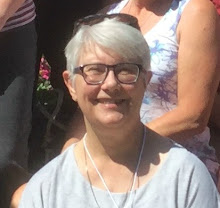Certainty is very comforting.
Certainty can be a powerful 'drug'.
It can also close a mind to additional information.
In weaving, new practitioners want to know The Answer. They want to know what to do. They don't take much comfort being told 'it depends'.
Just like in life, weaving is chock full of variables.
In the photo above (which regular readers of this blog will be familiar with), two yarns are shown. Are they the same?
Quite obviously - not.
And yet...
Both yarns are spun from cotton. Both yarns have approximately the same number of yards per pound. Frequently weavers assume that they are in fact identical when, upon closer examination, they are obviously not.
When the differences are pointed out to them, some people get quite defensive because they didn't know. As if their certainty was some kind of character flaw and they can't accept that their certainty was misplaced. Misguided, even.
When all it means is that they were not completely informed, which is nothing to feel shamed about, just, you know, accept the fact that that certainty was based on incomplete information, and now that they know better, they might want to do better.
Because that's the thing. Life is all about learning more. Doing the best we can until we know better. And then doing better. Making more appropriate choices, based on the more complete data.
So when someone says they don't know something, and they are given more information, the appropriate response is to not chastise the person doing the informing. The appropriate response is to thank the person for taking the time to educate.
When white people say they don't see racism, the reason is because they are not the ones being discriminated against. When POC report constant harassment and suppression, white people need to take a moment to see what is happening. The appropriate response is to look at their own attitudes and examine how they feel when another black (or brown or whatever 'non' white) person is killed/injured, ignored or verbally abused in public.
And again I suggest white people who do not understand racism in North American society seek out and listen to what Jane Elliott has to say. Because maybe it will make more of an impact coming from a white person than the hundreds of black people who have been trying to get the message out for decades.
The first step is to set aside certainty and open ones mind to more information.




No comments:
Post a Comment